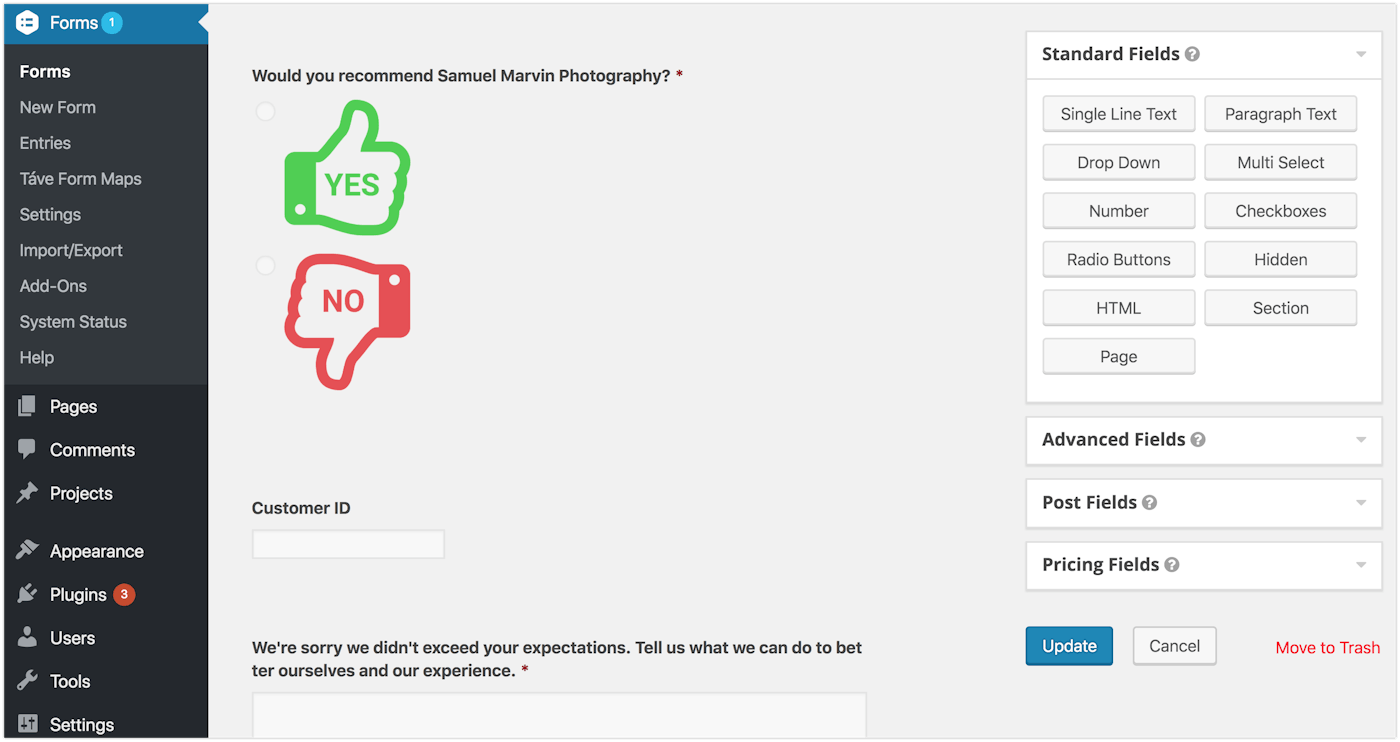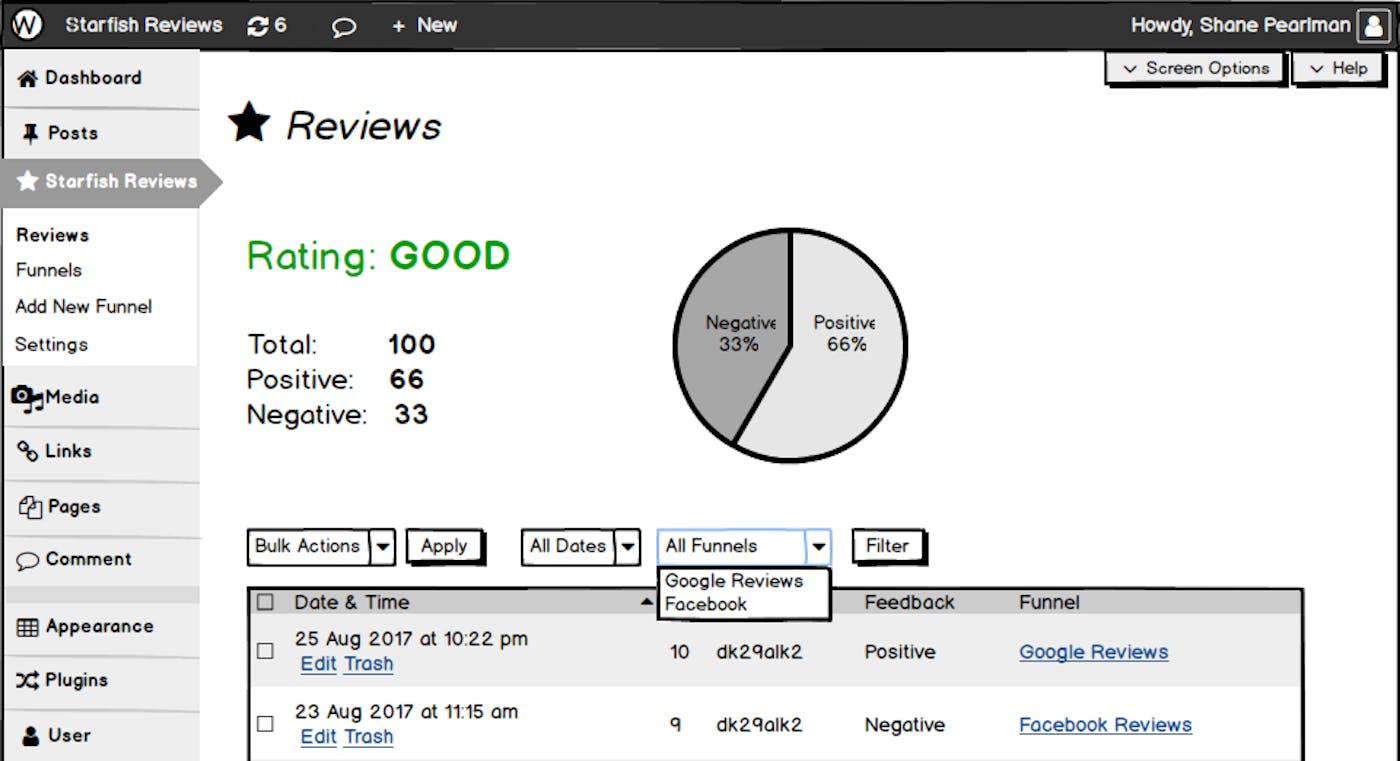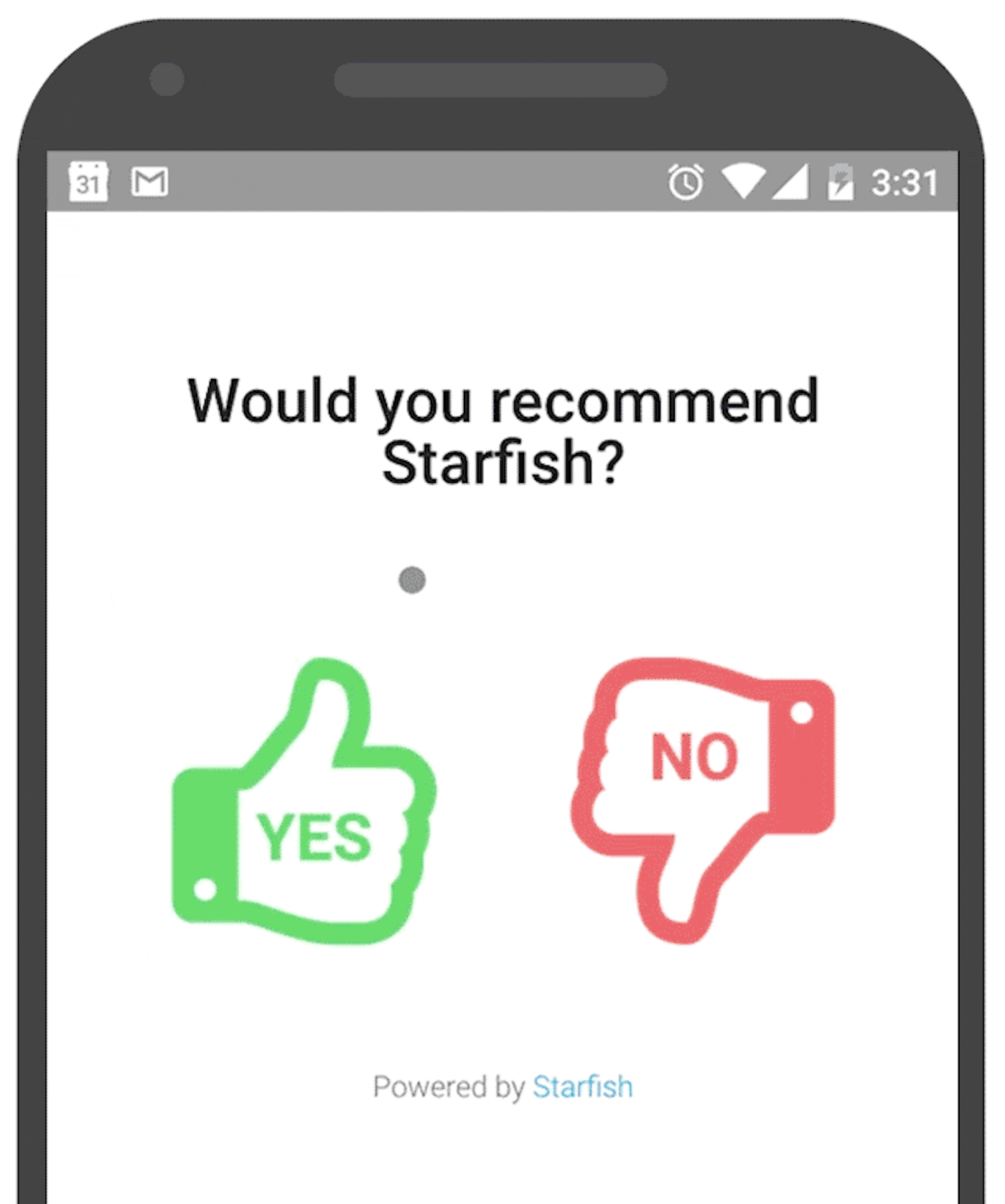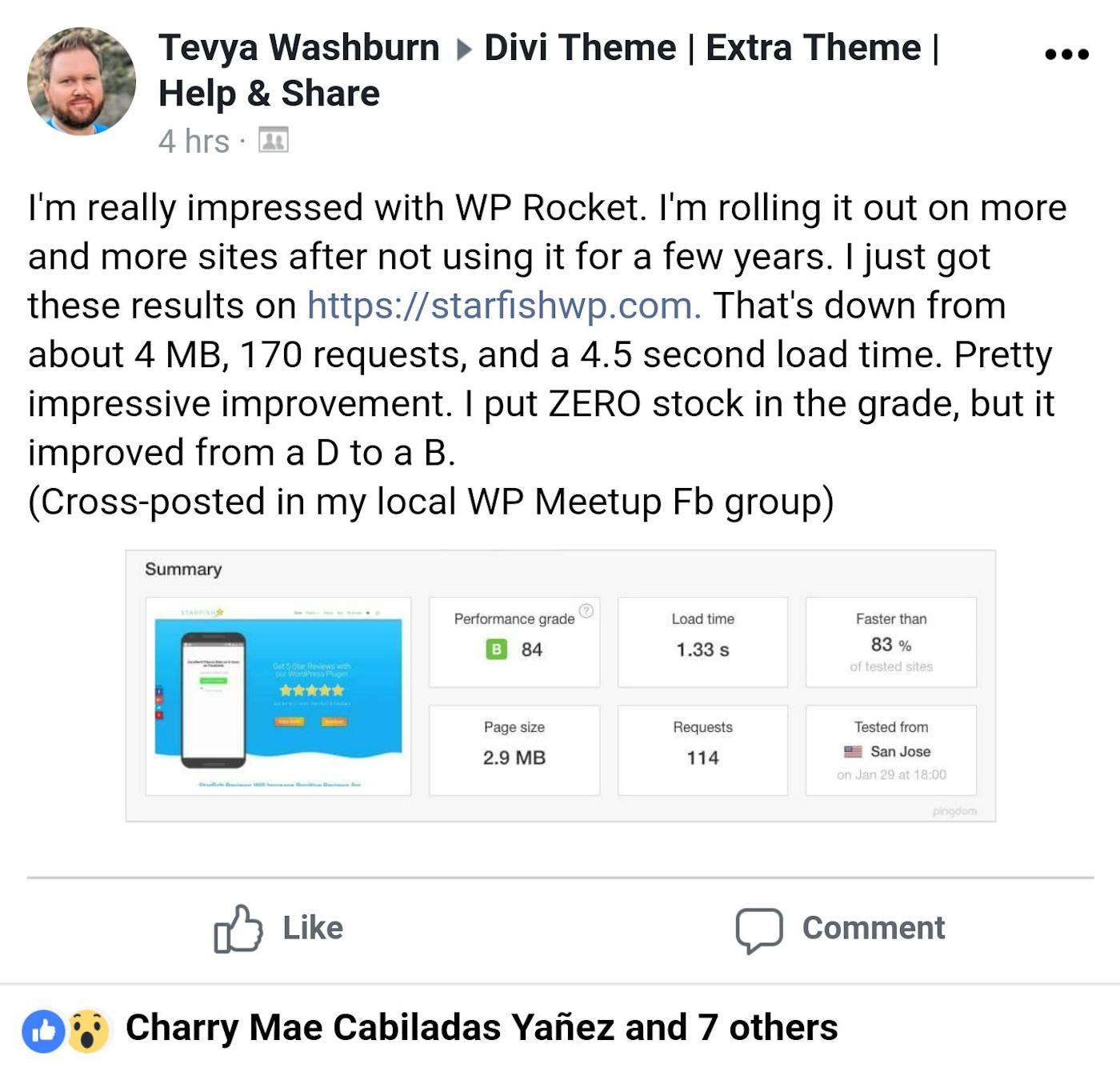Building and Growing a WordPress Plugin for Managing Online
Reputation
Hello! What's your background, and what are you working on?
I'm Tevya Washburn. I grew up on a farm on the edge of town in Idaho. I loved to ride my horses. When it was too cold or I was too sun-worn, I'd head inside to tinker with computers. I taught myself Photoshop and website design. I later paid for most of my college degree in History doing freelance web design and video work.
I found WordPress in 2008 and turned my WP freelancing into a legit business a few years later, designing, building, and managing WordPress websites for people. That business is now called WordXpress, formerly Fiddler Online.
What motivated you to get started with Starfish Reviews?
Many of our WordXpress members are small, local businesses. We'd get questions from them about improving online ratings and reviews. But most of these online "reputation management" companies were charging $300/month for their cheapest packages. It was too much for most of our members.
A salesman at one of those companies explained that the heart of what they do is a simple landing page that has a simple yes/no question about whether or not you liked the business. Their clients could then text or email that page to customers and ask for some feedback. If they indicated "yes," then it would ask them for a positive review on Google My Business, Facebook, Yelp, TripAdvisor, etc. If they indicated "no" it would ask how they could improve and capture that for internal review. I thought, "Huh! I could do that."
Of course, these companies have a full dashboard with analytics based on scraping reviews from all those sites, plus SMS integration for texting the link to the page, etc. But at its heart, the real value is just that simple landing page to filter those with good things to say from those with bad things.
I didn't do anything about my thoughts until months later, when one of our members sent me the link to one of these review "landing pages" (or "funnels" as we now call them). One of his vendors had sent the link to get feedback from him. He asked me if I could add something like that to his website. I said "sure." I searched to see if there was a WordPress plugin already doing that. I was surprised that I couldn't find one. So I built the same functionality into what ended up being our prototype on Gravity Forms with some CSS. I didn't write a line of code to build it. Here's a screenshot of that original prototype in Gravity Forms:

He started texting that page out to his clients and added over 100 four- and five-star reviews to his Google listing over the next 6 months! Soon after he started using it, I looked at the numbers and thought, "We should offer this as an upsell for our other members." It would be a little time-consuming to replicate the prototype solution on each site. The logical solution was to build a plugin that would be easier to deploy. And of course, the next mental step was, "let's sell it!" That's how Starfish Reviews was born.
What went into building the initial product?
With the prototype built and having proven the concept, I talked to Anas bin Mukim, a developer I've worked with for many years. In August of 2017, I offered him a 20% revenue-sharing arrangement to work with me to build it as a WordPress plugin. I figured about a 50% budget for the website and hosting, marketing, SaaS Services like Help Scout to provide support, WordPress and WooCommerce plugins, affiliate payouts, etc.
Then 10% for merchant fees, exchange rates and a miscellaneous buffer. With 40% remaining, we could each get paid 20% for our time and effort. Anas would write the code and I'd design the UI, do the marketing, etc. Anas was excited about it and ready to start right away. This arrangement was perfect for a bootstrapped project, since he'd get paid based on actual sales, rather than me having to pay him hourly. So far that's worked out well and the numbers seem about right.
I'm a big fan of The Lean Startup and so I mapped out the bare-bones minimum viable product features for the plugin. It was basically just everything I'd prototyped on Gravity Forms, built on WordPress' custom post types.
The main difference would be what we call "funnels" which are those simple landing pages with the yes/no question on them. In the plugin, you can create multiple funnels to take them to different review destinations or for tracking purposes. I included some wireframe mockups made in Balsamiq. Then Anas got to work. He built version 1.0 and soon after 1.1. Then we tested it on several hosting setups with different versions of PHP as well as alpha versions of WordPress. We also tested with the Gutenberg plugin to ensure it would work fine with that as WP 5.0 nears completion.

Around the same time, I had Dafina, a logo designer I've worked with in the past, create a logo for us. I also asked Roge, one of my designers at WordXpress, to start working on the design of the site. So most of our realized expenses came down to paying Dafina $60 for the initial logo versions, purchasing WooCommerce API Manager plugin to manage the licensing and auto-updates, and a few other little plugins and services we used to make the site work the way we wanted. I had a lifetime license of WooCommerce Subscriptions from back in the day when WooCommerce sold its extensions with a lifetime license, so I didn't have to pay for that. Roge's time was just lumped in with his work for WordXpress as were our hosting fees. We got Help Scout for WordXpress, but there's no extra cost to add another mailbox. So our total, Starfish-unique costs were only maybe $400, assuming $0 value for all the time spent by Anas and I.
It occurred to me that Black Friday might be a good time to launch this. We were in Spokane, WA, visiting Jill's parents for Thanksgiving. We had the completed MVP version of the plugin and a mostly finished website and platform to sell it and manage licenses. So the two days before Thanksgiving, I went to the local library and locked myself in a room for about 14 hours straight! I hammered out all the design and functionality on the website to a point I was happy with it.
I probably went way past MVP territory. Being a designer, I get stuck on the little details of design and making sure everything is set up and running properly. That included an animation demonstrating how the plugin works, a newsletter system setup on MailPoet (for now), and some code snippets and lots of CSS to make the WooCommerce My Account and Checkout pages simple and streamlined. I also moved a number of posts from the WordXpress blog over to Starfish, because they seemed to fit better there at the time. That was another mistake. Pivoting to WordXpress with a focus on management instead of design has made those much more relevant on WordXpress. This was one mistake I couldn't have foreseen as I hadn't decided to pivot Fiddler Online to WordXpress at that time.

How have you attracted users and grown Starfish Reviews?
I put up a special "Black Friday + Launch" deal with lifetime licenses and the Webmaster (unlimited) license priced at $99. Then I contacted several sites that were listing WordPress deals, asking if they could list our deal. It was the night before Thanksgiving here in the US. I think only two or three sites actually got the deal listed. I shared it out through some social media channels. It got the most traction from a few Facebook Groups.
In all, it was enough to get about 300 visits the week before and after Thanksgiving. That resulted in 5 awesome individuals buying our Webmaster license! It proved people were interested and willing to pay for what we were offering. It was exciting stuff. Then I got sick....
On the drive home from Spokane, I noticed my throat was tickling. The next day I was sick. It was the strangest illness I've ever had. I never really felt all that ill. My throat bothered me a little and my body felt weaker than normal. But overall I wasn't that bad off. However, I'd take a nap in the morning because I felt too tired to work, and would sleep for 6 or 7 hours! Then I would go back to sleep a few hours later and sleep for 14+ hours overnight! I'd always wake up feeling relatively fine, but couldn't do much before I was so tired I'd go back to sleep. This continued for over a week before I pulled out of it.
It obviously set me back and I was unable to capitalize on any momentum we might have had from the Black Friday launch. I also had to catch up on work for our main website business before I could focus on Starfish again.
It was then well into the Christmas season and I just felt like it was bad timing to do much more. So it was late January before we were able to make another push. But that did give us some time to do a few other things in the meantime. For example, I was able to get the owners of the plugin Plugin Reviews (a plugin that displays your plugin's WordPress.org reviews on your WP website) to allow us to take over that plugin and update and fix it. It hadn't been updated in quite some time and wasn't working correctly. It aligns somewhat with Starfish Reviews, and also helps give us some exposure on WP.org, even though we hadn't yet completed the free version of Starfish Reviews.
It was still very early stages for us and between catching up from being sick and planning a new year, I didn't have a lot of time. Since only a few had bought the plugin in November and December on the lifetime deal, we decided to offer the lifetime deal for a little longer. We priced the Webmaster license at $99 again and promoted it as a "Start 2018 off Right" deal. I posted on the blog about it, then we shared it on social media in mid-January. Not much happened. One person purchased, and that was it. That brought our total to 8 customers and $792 in sales. Not bad, but not great.
Toward the end of the month, with the end of the lifetime deal approaching, I installed WP Rocket on the site and was impressed by the speed gains after configuring it properly. I posted about it on a Facebook Group for people who use the Divi theme, since that's what we used for our site. That got some traffic and attention and I believe a few people purchased it.
Josh Rohrback, a member of that group who runs Magi Web Design, saw that post. He was also a member of the group Lifetime Tech Deals Fans. He mentioned our deal there and almost immediately I started getting new order notifications in my email! I actually had to look at analytics and such to piece together what had happened. Once it was shared in that group it started selling quite fast for the minimal exposure and effort I'd put into it. From Jan. 24 through Feb 3rd, when the deal ended, another 30 people purchased the lifetime deal for a total of $3613 in sales!

We got really lucky that Josh saw that post and reshared it in a group more focused on those kinds of deals. But if you've got a product or service you're willing to sell with a lifetime license, a group like that can be great. My guess is we were able to sell it at a much higher price than if we'd gotten on one of those deals sites.
I recently read about lemlist's experience with AppSumo and do not feel like that was a good model for a business like ours. I'd really like to hear from companies who did a deal with AppSumo, six months or a year ago. I want to know if they have any quantifiable evidence that all that "exposure" resulted in recurring sales after the deal was over.
Back to our story, we got a lot of great users and some solid revenue for such a young product. More importantly, we got enough new users to start talking to them and creating a community.
What's your business model, and how do you sell your product?
Our model is pretty similar to most premium WordPress plugins with a single-purchase model. As of writing this, you can buy our Webmaster license for $99/year, or our Business license for $39/year. Webmaster is for unlimited funnels and can be activated on unlimited sites. The Business license is for one site, plus one staging or dev site.
I'm frustrated when I can't auto-update a premium plugin when I'm testing it somewhere other than the main site I bought it for, so I felt this was a good solution. Since the lifetime deal closed, we've been charging those prices and have had another 23 people purchase our yearly model. Two of those exercised our "no questions" refund policy, within the 14 day grace period. We assume some of that has come from using the free version of our plugin on WordPress.org, called Starfish Reviews Lite, though we're working on better tracking for that.
As we add major features, we plan to increase the price. When we've built the plugin into something like my vision for it, the price will likely be over $300/yr, but that's awhile (and a lot of work) out. I feel unappreciated when companies give these super deep discounts but they're "for new customers only." It's unethical in my book, and at very least, a slap in the face to the long-time customers who've kept them in business. So, all of our members will keep the price they purchased at, no matter how many more awesome features we add, or how much more we raise the price from where it was when they purchased. We appreciate them helping us get started and staying with us for the long term.
To run the whole thing, we use WooCommerce, as I've mentioned. We set up licenses as a yearly subscription on WooCommerce Subscriptions. I decided to offer both Stripe and PayPal options. I'm really not a fan of PayPal, but many online marketers, webmasters, and freelancers (our target market) use their PayPal account like a business checking account. So I included it as an option with Stripe as our default.
What are your goals for the future?
Revenue has slowed since our lifetime deal ended, as you might have guessed from the numbers, but we still get sales every few days. We've been focusing on improving the plugin and getting some lead capture and sales funnels set up.
We're in-process of working out a deal with one WordPress community to offer their members some special pricing. Depending on how it goes, we may do similarly with other communities or groups.
We're also working on posting great new content and tools related to reputation management, ratings and reviews, WordPress marketing, and more. Hopefully that, combined with some posts, podcast interviews, and more that I've lined up, will help bring our traffic up. We'll likely also tinker with some AdWords and/or Facebook Ads.
People seem to understand the value of Starfish Reviews and what a great tool it is for helping them in their online review marketing, once they see it. So a big part of our goal is just increasing our traffic and exposure. The most important goal, though, is sales.
We need more people purchasing the plugin, using it, giving us feedback, participating in our community, and spreading the word. Our goal is to build the marketing efforts I mentioned throughout the year, to hit 50 new members through sustainable efforts (ie. not "special" promotions) in December, and grow from there. That should mean a sustainable ~$4k/month in sales, and growing throughout 2019. We'll set new goals at that time.
Another goal is to continue iterating quickly on the plugin itself. We see a lot of potential for lots of features that those $300/month SaaS companies offer. We haven't set specific goals for features yet, but try to release at least one update with at least one significant new feature every 2 months. So far we've been doing even better than that. Exciting things are coming!
What are the biggest challenges you've faced and obstacles you've overcome, and what are some you expect in the future?
Since I've already bootstrapped another business into success, failing many times in the process, I feel like I've made far fewer mistakes this time around... at least so far. I already talked about making the mistake of doing way more than an MVP on the website design and setup. I also shouldn't have moved posts from our WordXpress blog to Starfish's.
Another mistake was deciding to run all the Starfish stuff through our WordXpress Stripe and PayPal accounts. I told myself "Simplest is best! Just ship." And that's probably the right answer and attitude 95% of the time.
However, in this case it ended up causing some hassle. There were two parts to the problem. One was the potential for confusion in our bookkeeping. It's just much easier if everything goes through separate merchant accounts. However, the main problem was the potential to send payment confirmation emails to Starfish buyers that were confusing because of WordXpress branding on them.
We recently started using ChargeDesk to handle dunning, receipts, and allow us to easily get updated payment info from our WordXpress members. ChargeDesk has ways to filter, but nothing that would consistently work for our setup. I ended up changing the PayPal account to be for Starfish alone since WordXpress wasn't using it much, and then created a new Stripe account for Starfish.
I worked with the Prospress team and Stripe to make sure I could transfer existing customers and payment methods to a new Stripe account, then reconnect them in WooCommerce Subscriptions, so that subscriptions would continue without a hitch. Now that the two brands have different accounts, ChargeDesk allows us to have them all connected in our ChargeDesk account, but under separate organizations. So now we have branded automatic dunning emails, receipts, etc, for WordXpress transactions. All that stuff is handled by WooCommerce on Starfish. Yet I can still see all the ChargeDesk info our members from both brands.
With that challenge behind me, our biggest challenge is my time. My team and I are running WordXpress and trying to pivot into that brand and business model. Since it's what pays the bills right now, it's hard to allocate time and resources to Starfish. I'm also a husband, father of 3.5 (one on the way), and serve in my church. That's why I had to work two 14-hour days while we were supposedly on holiday in Spokane.
I really enjoy working on Starfish, though, and am passionate about helping small businesses, WordPress webmasters, and online marketers do great things with ratings and reviews management. So I'm carving out time where I can to provide support for the plugin, work on improving it, produce content for the blog, learn and implement better marketing techniques, and just generally tell our story.
Other roadblocks or hurdles we may encounter might include Gutenberg and competition. The Gutenberg editor in WordPress is something I'm really excited about. It's going to take some work for us, but we'll definitely add a "Gutenblock" to the plugin, in the future. We may also restructure much of the plugin's interface to run on Gutenberg/React at some point, as well.
Many challenges are like the one Gutenberg presents: it's all a matter of perspective. If we focus on the change and all the hard work, it's pretty easy to get frustrated with Gutenberg. But we choose to welcome and embrace it as an opportunity to improve our plugin and support the future of WordPress. In that light, it doesn't seem like a problem at all.

Competition can feel scary, especially when you're first in a niche. I'm an abundance-mindset kind of person and believe there's plenty of room out there for Starfish Reviews and other WP plugins who want to compete with it. Maybe someone will read this interview on Indie Hackers and think "I could build that," just like I did. I'm still a little surprised we're the first and only product in this niche, so far. When someone else builds a plugin that competes directly, that'll be a challenge, as well. People who want a review management plugin on WordPress will have more than Starfish Reviews as an option.
I'm a competitive guy, so I'd like to stay on top and maintain whatever lead we have right now. But if it happens to be an established company in the WordPress or reputation management space, they could easily become the more popular solution. They'll have the resources to quickly build similar functionality and market it, to catch up with us. Plus, they'll have the brand awareness and following to launch with a lot of exposure right out of the gate.
If that happens, we'll have to accept second place, at least for the time being. That doesn't mean we can't reach our goals, though. As I said, the market for this is huge. My hope is that our competitor is another Indie Hacker-type, working by herself, or with a small team like us. Then we can have some real friendly competition with a more equal playing field!
Have you found anything particularly helpful or advantageous?
As I mentioned, I really like The Lean Startup. The book Rework by the guys at Basecamp has been invaluable, as well. There are so many great principles of how to work and run a company, especially a distributed one. I love their company and approach to things, even though I don't use Basecamp. I think I've read that book three times now.
I can't recommend Essentialism by Greg McKeown enough. It's one of those books that impacts every aspect of your life. I've read it 3 times, as well. I try to use essentialist principles in my business and personal life. This one's so good I kept using Audible's "give" feature to give it to people. I did it so much, Audible won't allow me to "give" that title away anymore 😆.
Work the System by Sam Carpenter also deserves mentioning. It's changed my whole approach to documentation and systems in my business. It's helping me build a business that's a joy to run and work in.
I'm also in love with Help Scout right now. I went through a long process of research to decide on it over several others. From the start, it had my attention because of its sheer simplicity.
Initially, I thought I wanted a live chat option, and it didn't have one (though they're now about to launch one). However, I read an article from one company that moved from a live-chat support system to Help Scout and they pointed out two things I'd never thought of: a) Chat support is often slower. That's because it's "synchronous," so people put less thought into replies, causing conversations to go longer, and the support person has to wait if they get distracted or need to try something. So it often has a much higher time-cost than email support, and b) If you have a chat feature on your site, you set the expectation that you're available "right now" and let people down when nobody's available.

I've had the latter experience frequently. I click the little chat-type icon thinking "I'll just ask them a quick question and be on my way." Then 30 seconds after submitting my question, it says they're not available and asks for an email to follow up with me. I feel let down! So those two points rang true for me, and I didn't want to give our users users that experience.
That made it easy to choose Help Scout. We've really loved it, despite a few speed bumps in getting it implemented. If I could change one thing about it, it would be to add native Asana (our project and task management app) integration with notes from Help Scout synced to Asana as comments, and vice versa. Currently there's no direct integration between the two.
What's your advice for indie hackers who are just starting out?
-
The best thing anyone can do to create a new business, especially if it's based around a software product, is just get it shipped! I know lots of people say this, but it's true. The way I figure it, most new businesses are about 20% product and 80% marketing. For me, as for many people, it's the marketing that's the hard part. So just having a minimum viable product completed is only the first step. Then the real work begins. I've found that I enjoy some parts of marketing, like producing content, a lot more than others. So sandwiching the less enjoyable things between the ones I like helps a lot. Finding someone to do it for you is also a great hack for that problem!
-
It's important not to undersell yourself or your product. Many businesses fail because the whole cost of production, support, sales, marketing, etc. isn't taken into account. Some people might look at our plugin and think, "That's not all that complex! You want $99/yr for that?! It costs you almost nothing for each copy." And my response would be, "You're right, it's not very complex. Not yet. But when you buy it, you're not just buying software, you're buying support from myself and my team (who are really great at it), and you're buying all the future features that we're working on adding." Plus, I could point out that if they resell it to their clients at $20/month, it only takes one client to make it a profitable investment. So, look at the big picture and sell your product based on the value it provides, not how much you think it needs to be based on features or competition.
-
Read great books, like those I've mentioned above. Plus read and listen to media that encourages, educates, and motivates you, like Indie Hackers. Don't spend all your time doing that stuff, though! It's easy to get caught in the deluge of information that's available today and not execute your product. If your product is your passion, it's also easy to get caught up in working on your product, and not market it. Find a balance that works for you, but make sure that consuming is in the minority! Always market more than you want to, ship while your product still feels too simple or raw to show, and read or listen to great books, podcasts, and articles (in that order) to fill in the gaps.
Where can we go to learn more?
You can follow Starfish on Twitter: @starfishwp, or I'm @tevyaw. Our blog is a good source of updates about our company, plugin, and review marketing tips. Feel free to ask me anything. I try to be open about my life and transparent with my businesses.

Nice article! I will add your tool into my guide on generating reviews: https://www.duncanjonesnz.com/how-to-generate-reviews/. Great to see a tool pushing the reviews onto third party sites that count vs storing it on their website like most do.
Awesome! Thanks @DuncanJones. If you PM me, we can get you signed up as an affiliate so you can get credit for anyone who clicks through and buys.
Hey Tevya - happy to share your software with no affiliate link - prefer to just share the best software available!
Very nice article @tevya . I wish you all the best with Starfish Reviews!
One thing is still mysterious for me - how do you find time for working on Starfish having 3 kids (and one on the way - congratz!). It seems like this business for you is a side project. I've just become a father (6 weeks old son) and I feel that I still didn't organize myself properly and can't find time for side project :|
Anyway, fingers crossed for your December goal :)
@tniezurawski thank you for your kind words.
To answer your question: as I said in the article, I'm self-employed via my other business. So I just carve out time here and there to work on Starfish. I usually do it within hours I would have worked anyway. It's actually forced me to be more focused and effective at delegating to my team and at working on the most essential and important things.
I find a few things really help each day go well: 1. Religious or Philosophical study. Study writings that have stood there test of time and contemplate things that are much higher than our daily problems. It's good for your soul and puts things into a much clearer perspective. 2. Excercise. Take care of your body and wear it out some. This helps me think more clearly so I can work faster and more effectively, so I have more time and clairity to still be a husband and father. There's more on both these ideas in the Essentialism book I talked about. I'm not perfect, still striving. But I think that book might help answer your question better than I can.
This is a well-written article! Made me sign-up for IH. Wishing Starfish a bright future.
Thank you @lazdins!
What what does "IE" refer to?
A typo - I was thinking Indie Hackers 😀
Oh, "IH" haha! I was trying to figure out what service I mentioned in my article had the initials of "IE"? 😄
I can only give you props for this well-written and detailed article on you and your team's effort. Good job, and good luck increasing your MRR.
Thank you @ramoncacho !